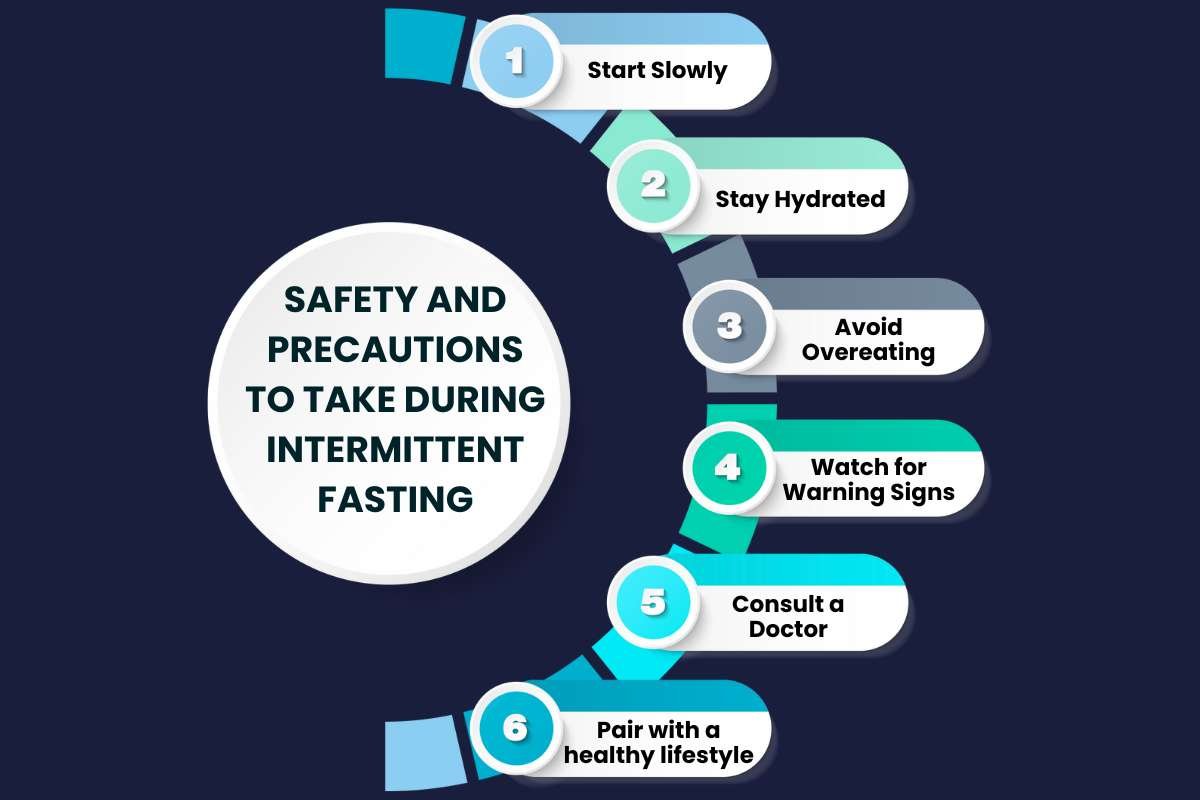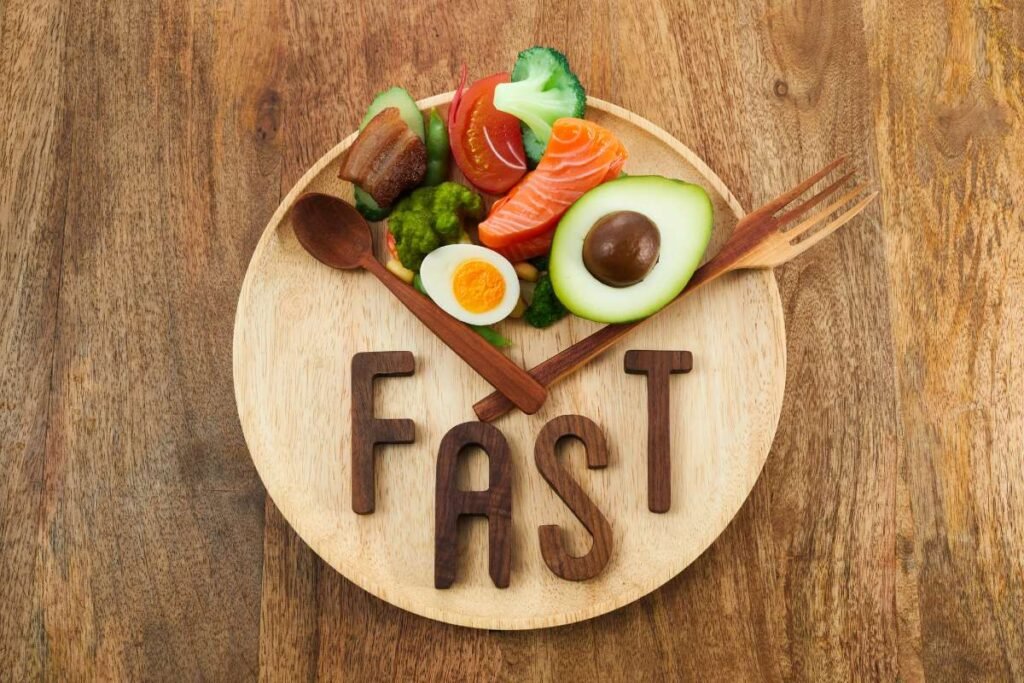Are you looking for a way to manage your weight, boost energy, or improve overall health without complicated diets? Intermittent fasting (IF) might be the answer. Unlike traditional diets that focus on what you eat, IF focuses on when you eat.
Cycling between eating and fasting periods helps your body burn fat, regulate hormones, and even improve metabolism. In this article, we’ll explore how it works, its benefits, and tips to follow it safely and effectively.
What is Intermittent Fasting?
IF is an eating pattern that alternates between periods of eating and fasting. Unlike traditional diets, it doesn’t tell you what foods to avoid. Instead, it focuses on timing your meals.
During your eating window, you can enjoy balanced meals. Then, during your fasting period, you avoid calories and let your body shift into repair mode. This method has been practiced for centuries in many cultures, often linked with better digestion and mental clarity.
Common schedules for this type of fasting include 16:8 (fast for 16 hours and eat within 8), 14:10, and the 5:2 method. These options make it easy to choose one that fits your daily routine.
How Does Intermittent Fasting Work?
When you eat, your body uses glucose from food as its main energy source. Glucose comes from carbohydrates and is stored in the liver as glycogen. Between meals, when you fast, insulin levels drop. Once your glycogen stores run out, your body begins burning stored fat for energy.
This shift is called metabolic switching, a key reason why intermittent fasting helps with fat loss. It also gives your digestive system a break and reduces inflammation.
Fasting triggers another process called autophagy. This is your body’s natural cleaning cycle, where old or damaged cells are broken down and replaced by new ones. Autophagy supports brain health, heart function, and longevity.
The longer you fast, the more your body enters these repair and fat-burning stages. However, balance is important. Long fasting periods without guidance can lead to fatigue or nutrient gaps.
Key Elements of Intermittent Fasting
To make eating intermittently effective and sustainable, it’s essential to understand its core components. Each part plays a role in how your body adapts and benefits from fasting.
1. Fasting Window:

This is the period when you avoid food and calories. You can drink water, black coffee, or herbal tea. Most beginners start with a 12-hour fast and gradually extend it to 16 hours.
2. Eating Window:
During this time, you consume your meals. Focus on whole, nutrient-dense foods like vegetables, fruits, lean proteins, whole grains, and healthy fats. Avoid overeating just because the window is open.
3. Hydration:
Staying hydrated helps maintain energy and reduces hunger. Water, sparkling water, and calorie-free drinks are allowed during fasting.
4. Consistency:
Your body adjusts to fasting best when you follow a consistent schedule. Try to eat and fast at similar times each day.
5. Meal Quality:
Fasting like this isn’t an excuse for unhealthy eating. Balanced meals with fiber, protein, and healthy fats keep you full and energized.
6. Sleep and Recovery:
Rest supports hormonal balance, metabolism, and hunger control. Aim for 7–8 hours of sleep each night.
These components work together to make IF safe, effective, and sustainable for the long term.
Benefits of Intermittent Fasting You can’t Ignore
IF has gained attention for its wide range of health benefits backed by research. Here are the most studied and noticeable ones:
1. Weight Loss and Fat Reduction

By lowering insulin levels, your body becomes more efficient at burning stored fat. According to a study published in the National Library of Medicine, A systematic review of 27 trials reported weight loss ranging from 0.8% to 13.0% of baseline weight in participants using IF.
Also Read :- 7 Easy Meal Prep Ideas for Weight Loss That Taste Like Takeout (But Healthier)
2. Better Metabolic Health
Fasting can improve insulin sensitivity and help regulate blood sugar. This reduces the risk of type 2 diabetes and metabolic syndrome.
3. Improved Brain Function
It may support brain health by reducing oxidative stress and inflammation. It increases levels of brain-derived neurotrophic factor (BDNF), a protein linked to memory and learning.
Also Read ;-Is Your Diet Linked To Your Brain? Try These Brain Boosting Foods For A Healthy Brain
4. Supports Heart Health

Fasting helps lower cholesterol, triglycerides, and blood pressure, which are all key markers of heart disease risk.
5. Increased Energy and Focus
Many people report sharper focus and sustained energy after their bodies adjust to fasting. Without frequent blood sugar spikes, your energy stays stable throughout the day.
6. Cellular Repair and Longevity
Through autophagy, fasting helps clear damaged cells, reducing inflammation and possibly slowing aging. Animal studies show that fasting may extend lifespan, though more research is needed in humans.
Safety and Precautions to Take During Intermittent Fasting

While this type of fasting offers many benefits, it isn’t suitable for everyone. Some people may experience fatigue, headaches, or irritability when starting out. These effects usually fade as your body adapts. However, it’s important to fast safely and mindfully.
1. Start Slowly:
Begin with shorter fasting periods, such as 12:12 or 14:10, before trying longer fasts
2. Stay Hydrated:
Drink enough water throughout the day. Dehydration can cause dizziness and tiredness.
3. Avoid Overeating:
Don’t use your eating window as an excuse to binge. Focus on balanced, portion-controlled meals.
4. Watch for Warning Signs:
If you feel weak, lightheaded, or sick, stop fasting and eat something nutritious.
5. Consult a Doctor:
People with diabetes, low blood pressure, or eating disorders should seek medical advice before starting intermittent fasting. Pregnant or breastfeeding women should also avoid fasting without medical guidance.
6. Pair with a Healthy Lifestyle:
Combine fasting with regular movement, good sleep, and stress management for the best results.
Fasting should help your body and not stress it. Listen to your hunger cues and adjust as needed.
Intermittent Fasting Plan 101
Here’s a simple guide to common methods of fasting intermittently. Choose one that fits your schedule and comfort level.
| Fasting Type | Fasting Duration | Eating Window | How It Works | Who It’s Best For |
| 16:8 Method | 16 hours | 8 hours | Skip breakfast and eat between noon and 8 p.m. | Most popular and beginner-friendly. Ideal for consistent daily fasting. |
| 14:10 Method | 14 hours | 10 hours | Eat between 10 a.m. and 8 p.m. | Great for beginners easing into fasting. |
| 12:12 Method | 12 hours | 12 hours | Eat from 8 a.m. to 8 p.m. | Easiest plan for new starters. Good for maintaining weight. |
| 5:2 Diet | Fast 2 days a week | Eat normally 5 days | Limit intake to 500–600 calories on fasting days. | Suitable for those preferring flexible weekly fasting. |
| Eat-Stop-Eat | 24-hour fast once or twice weekly | 24-hour eating break | Example: Fast from dinner to dinner. | Works for advanced users. Not for beginners. |
| Alternate-Day Fasting | Fast every other day | Normal eating on alternate days | Some versions allow small snacks on fasting days. | For experienced fasters aiming for quick results. |
When following any plan, remember that the quality of food matters. Whole grains, lean proteins, vegetables, fruits, nuts, and healthy fats make fasting easier and more effective. Avoid sugary drinks and processed snacks during eating hours.
Conclusion:
Intermittent fasting offers a simple yet powerful way to support better health, balance energy, and improve overall wellness. By learning how meal timing impacts your body, you can make smarter food choices and build habits that last.
Whether you want to manage weight or boost focus, fasting intermittently can fit your lifestyle and help you feel your best.
FAQ
1. Does intermittent fasting help with weight loss?
A. Yes, it can. Fasting helps lower insulin levels and promotes fat burning. However, weight loss also depends on maintaining a healthy diet during your eating window.
2. Can I drink coffee or water during fasting?
A. Yes. You can drink water, black coffee, or herbal tea while fasting. Just avoid anything with calories or sugar, as it breaks the fast.
3. Who should avoid intermittent fasting?
A. Pregnant or breastfeeding women, people with diabetes, or anyone with eating disorders should consult a doctor before trying any type of fasting regimen.









